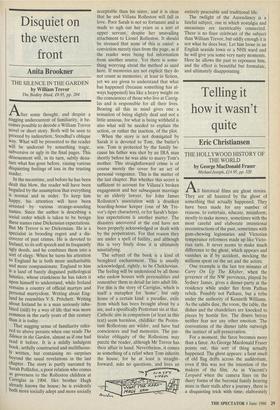Disquiet on the western front
Anita Brookner
THE SILENCE IN THE GARDEN by William Trevor
The Bodley Head, £9.95, _pp. 204
After some thought, and despite a nagging undercurrent of familiarity, it be- comes possible to decode a William Trevor novel or short story. Both will be seen to Proceed by indirection, Stendhal's oblique way. What will be presented to the reader Will be undercut by something tragic, subversive or ugly in the final pages. This denouement will, in its turn, subtly dena- ture what has gone before, raising various disquieting feelings of loss in the trusting reader.
In the meantime, and before he has been dealt this blow, the reader will have been -beguiled by the assumption that everything Is normal and in order. To keep him happy, his attention will have been arrested by various strange-sounding names. Since the author is describing a social order which is taken to be benign these names raise Dickensian expectations. But Mr Trevor is no Dickensian. He is a Specialist in brooding regret and a dis- coverer of past crimes. He is devoted to Ireland, to its soft speech and its frequently Ugly deeds, and he combines them into a sort of elegy. When he turns his attention to England he is both more uncharitable and more compassionate. England to him Is a land of barely disguised pathological lunatics, whose crankiness he has taken it Upon himself to understand, while Ireland remains a country of official martyrs and Personal martyrdom. Writing about Eng- land he resembles V.S. Pritchett. Writing about Ireland he is a man seriously inha- bited (still) by a way of life that was more common in the early years of this century than it is today. That nagging sense of familiarity refer- red to above persists when one reads The Silence in the Garden, almost as if one had read it before. It is a mildly indulgent book, artfully constructed and mellifluous- ly written, but containing no surprises beyond the usual revelations in the last chapter. The story is partly narrated by Sarah Pollixfen, a poor relation who comes as governess to the Rolleston children at Carriglas in 1904. Her brother Hugh already knows the house; he is evidently both more socially adept and more socially acceptable than his sister, and it is clear that he and Villana Rolleston will fall in love. Poor Sarah is not so fortunate and is made to sigh out her years as a sort of upper servant, despite her unavailing attachment to Lionel Rolleston. It should be stressed that none of this is stated: a conviction merely rises from the page, as if the reader were being fed information from another source. Yet there is some- thing worrying about the method as used here. If memories are not explicit they do not count as memories, at least in fiction, yet we are given to understand that what has happened (because something has al- ways happened) lies like a heavy weight on the consciences of those who live at Carrig- las and is responsible for all their lives.
Bearing all this in mind gives one a sensation of being slightly deaf and not a little anxious, for what is being withheld is also what will be needed to explain the action, or rather the inaction, of the plot.
When the story is not dominated by Sarah it is devoted to Tom, the butler's son. Tom is protected by the family be- cause his father was shot by an IRA man shortly before he was able to marry Tom's mother. This straightforward crime is of course merely the cover for an act of personal vengeance. This is the matter of the last chapter. But whether this secret is sufficient to account for Villana's broken engagement and her subsequent marriage to an elderly lawyer, for John James Rolleston's association with a drunken boarding-house keeper (one of Mr Tre- vor's riper characters), or for Sarah's hope- less expectations is another matter. The disasters uncovered at the end have not been properly acknowledged or dealt with by the perpetrators. For that reason they are under a spell of futility, and although this is very finely done it is ultimately unsatisfying.
The subject of the book is a kind of benighted enchantment. This is usually acknowledged, rightly, to be Chekhovian.
The feeling will be understood by all those who endow houses with personalities and remember them in detail far into adult life.
For this is the story of Carriglas, which is itself a metaphor for 'home', but only home of a certain kind: a paradise, exile from which has been brought about by a sin, and a specifically Protestant sin at that.
Catholic sins in comparison (at least in this text) seem harmless, childlike: the Protes- tant Rollestons are wilder, and have bad consciences and bad memories. The par- ticular obliquity of the Rollestons may puzzle the reader, although Mr Trevor has their affair in hand. Nevertheless, it comes as something of a relief when Tom inherits the house, for he at least is straight- forward, asks no questions, and lives an entirely peaceable and traditional life.
The twilight of the Ascendancy is a fateful subject, one in which nostalgia and uneasiness are inextricably connected. There is no finer celebrant of the subject than William Trevor, but oddly enough it is not what he does best. Let him loose in an English seaside town or a NHS ward and he will give you some very nasty moments. Here he allows the past to repossess him, and the effect is beautiful but formulaic, and ultimately disappointing.


















































 Previous page
Previous page